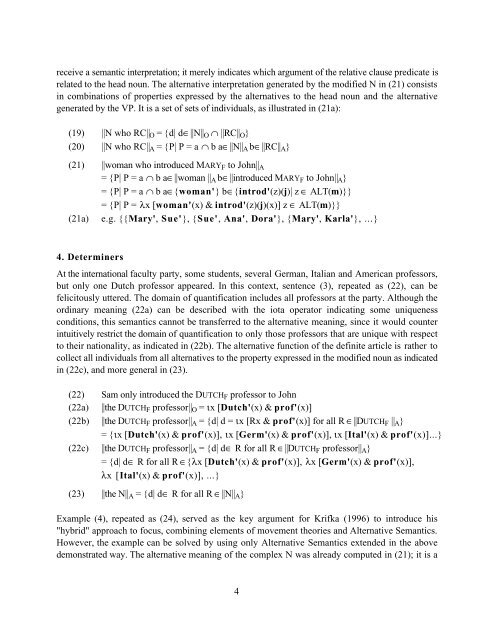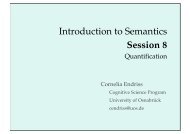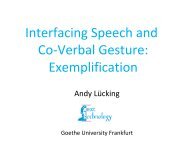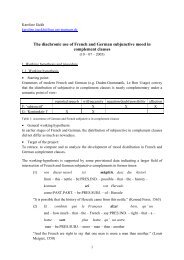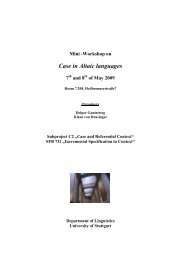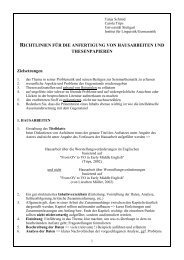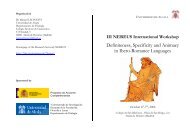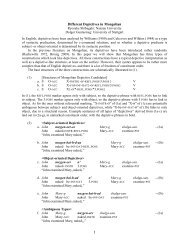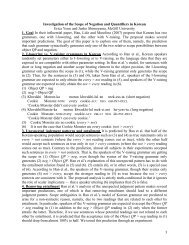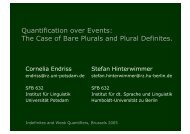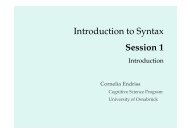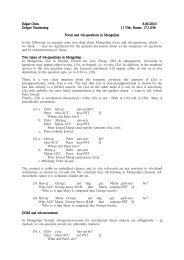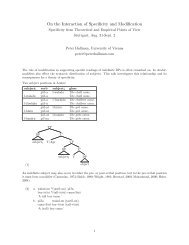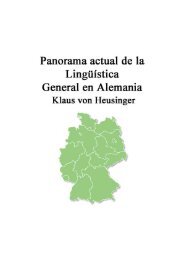Focus in complex noun phrases
Focus in complex noun phrases
Focus in complex noun phrases
Create successful ePaper yourself
Turn your PDF publications into a flip-book with our unique Google optimized e-Paper software.
eceive a semantic <strong>in</strong>terpretation; it merely <strong>in</strong>dicates which argument of the relative clause predicate is<br />
related to the head <strong>noun</strong>. The alternative <strong>in</strong>terpretation generated by the modified N <strong>in</strong> (21) consists<br />
<strong>in</strong> comb<strong>in</strong>ations of properties expressed by the alternatives to the head <strong>noun</strong> and the alternative<br />
generated by the VP. It is a set of sets of <strong>in</strong>dividuals, as illustrated <strong>in</strong> (21a):<br />
(19) ||N who RC|| O = {d| d∈||N|| O ∩ ||RC|| O }<br />
(20) ||N who RC|| A = {P| P = a ∩ b a∈||N|| A b∈||RC|| A }<br />
(21) ||woman who <strong>in</strong>troduced MARY F to John|| A<br />
= {P| P = a ∩ b a∈||woman || A b∈||<strong>in</strong>troduced MARY F to John|| A }<br />
= {P| P = a ∩ b a∈{woman'} b∈{<strong>in</strong>trod'(z)(j)| z ∈ ALT(m)}}<br />
= {P| P = λx [woman'(x) & <strong>in</strong>trod'(z)(j)(x)] z ∈ ALT(m)}}<br />
(21a) e.g. {{Mary', Sue'}, {Sue', Ana', Dora'}, {Mary', Karla'}, ...}<br />
4. Determ<strong>in</strong>ers<br />
At the <strong>in</strong>ternational faculty party, some students, several German, Italian and American professors,<br />
but only one Dutch professor appeared. In this context, sentence (3), repeated as (22), can be<br />
felicitously uttered. The doma<strong>in</strong> of quantification <strong>in</strong>cludes all professors at the party. Although the<br />
ord<strong>in</strong>ary mean<strong>in</strong>g (22a) can be described with the iota operator <strong>in</strong>dicat<strong>in</strong>g some uniqueness<br />
conditions, this semantics cannot be transferred to the alternative mean<strong>in</strong>g, s<strong>in</strong>ce it would counter<br />
<strong>in</strong>tuitively restrict the doma<strong>in</strong> of quantification to only those professors that are unique with respect<br />
to their nationality, as <strong>in</strong>dicated <strong>in</strong> (22b). The alternative function of the def<strong>in</strong>ite article is rather to<br />
collect all <strong>in</strong>dividuals from all alternatives to the property expressed <strong>in</strong> the modified <strong>noun</strong> as <strong>in</strong>dicated<br />
<strong>in</strong> (22c), and more general <strong>in</strong> (23).<br />
(22) Sam only <strong>in</strong>troduced the DUTCH F professor to John<br />
(22a) ||the DUTCH F professor|| O = ιx [Dutch'(x) & prof'(x)]<br />
(22b) ||the DUTCH F professor|| A = {d| d = ιx [Rx & prof'(x)] for all R ∈||DUTCH F || A }<br />
= {ιx [Dutch'(x) & prof'(x)], ιx [Germ'(x) & prof'(x)], ιx [Ital'(x) & prof'(x)]...}<br />
(22c) ||the DUTCH F professor|| A = {d| d∈ R for all R ∈||DUTCH F professor|| A }<br />
= {d| d∈ R for all R ∈{λx [Dutch'(x) & prof'(x)], λx [Germ'(x) & prof'(x)],<br />
λx [Ital'(x) & prof'(x)], ...}<br />
(23) ||the N|| A = {d| d∈ R for all R ∈||N|| A }<br />
Example (4), repeated as (24), served as the key argument for Krifka (1996) to <strong>in</strong>troduce his<br />
"hybrid" approach to focus, comb<strong>in</strong><strong>in</strong>g elements of movement theories and Alternative Semantics.<br />
However, the example can be solved by us<strong>in</strong>g only Alternative Semantics extended <strong>in</strong> the above<br />
demonstrated way. The alternative mean<strong>in</strong>g of the <strong>complex</strong> N was already computed <strong>in</strong> (21); it is a<br />
4


